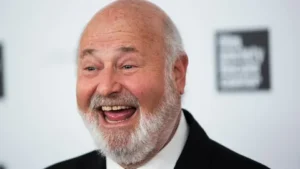It’s Saturday night. You’re settled on your couch with a drink, and that familiar theme music starts playing. Jonathan Ross strides onto the screen with that signature energy, ready to charm both you and whichever A-list celebrity is sitting on his famous sofa. For over two decades, this has been the weekly ritual for millions.
But here’s where things get interesting – Google “Jonathan Ross” today, and you’ll discover there are actually two incredibly successful men with this name making waves in completely different worlds. One’s the king of British chat shows with his wife Jane Goldman by his side. The other? He’s revolutionizing artificial intelligence with computer chips that make your brain hurt just thinking about them.
I know, right? Plot twist.
Let me take you through the fascinating worlds of both Jonathan Rosses – the broadcaster who’s been in our living rooms for decades and the tech genius most people have never heard of. Trust me, by the end of this, you’ll have some seriously impressive dinner party conversation material.
Who Is Jonathan Ross and What Is He Famous For?
Let’s start with the Jonathan Ross you probably know – or think you know.
Jonathan Stephen Ross was born on November 17, 1960, in Camden, London. But here’s what most people don’t realize: before he became the smooth-talking, sharp-suited broadcaster we see today, he was a film-obsessed kid who practically lived in his local cinema. That passion for movies? It never went away. It became his superpower.
Ross burst onto the scene in the late 1980s with “The Last Resort with Jonathan Ross” on Channel 4. The show was edgy, unpredictable, and unlike anything British television had seen before. He wasn’t trying to be the next Michael Parkinson – he was creating something entirely new.
But the real magic happened when the BBC gave him Friday Night with Jonathan Ross in 2001. For nearly a decade, this show wasn’t just appointment television – it was a cultural phenomenon. From Madonna discussing her yoga practices to trying to get Tom Cruise to address those Scientology rumors, Ross had this uncanny ability to make celebrities actually be themselves rather than trot out rehearsed PR talking points.
His interview style? Imagine if your wittiest friend got to chat with Hollywood stars while being paid millions to do it. That’s essentially Ross’s genius – he combines genuine film geekery with sharp humor and just enough irreverence to keep things interesting.
The Numbers Don’t Lie
Let me throw some facts at you:
- 35+ years in broadcasting
- Three BAFTA Awards for Friday Night with Jonathan Ross
- Officer of the Order of the British Empire (OBE) awarded in 2005
- One of the highest-paid presenters in British television history
Is Jonathan Ross Still Married to Jane Goldman?
Here’s one of my favorite celebrity love stories, and it’s absolutely true: Yes, Jonathan Ross has been married to Jane Goldman since August 1988.
Now, if you’re doing the math, that’s over 36 years of marriage in an industry where relationships typically have the lifespan of a mayfly. But this isn’t your typical celebrity marriage story – it’s actually way more interesting.
Jane Goldman isn’t just “Jonathan Ross’s wife” (a phrase that would probably make her roll her eyes). She’s a powerhouse screenwriter and author in her own right. We’re talking major Hollywood credits:
- Kingsman: The Secret Service (2014)
- X-Men: First Class (2011)
- Kick-Ass (2010)
- Stardust (2007)
- The Woman in Black (2012)
The couple met when Jane was just 16 and Jonathan was 18. She was a music journalist; he was already making waves in broadcasting. They married when she was 18, and everyone probably thought, “Well, that’ll last about five minutes.”
Three and a half decades later, they’re still together, running a production company called Hotsauce TV, and raising three wonderfully named children:
- Betty Kitten Ross (born 1991)
- Harvey Kirby Ross (born 1994) – named after legendary comic book creator Jack Kirby
- Honey Kinny Ross (born 1997) – who’s now following in her mother’s footsteps as a screenwriter
Their secret? From what I can gather, it’s mutual respect for each other’s careers, shared interests (they’re both massive comic book nerds), and the fact that they genuinely seem to like each other. Revolutionary concept, I know.
What Is Jonathan Ross’s Net Worth in 2024-2025?
Let’s talk money. Because you know you’re curious.
Jonathan Ross’s net worth is estimated at somewhere between £28-30 million (roughly $35 million USD). Now, before you start checking property listings in Hampstead, let me break down how he accumulated this fortune.
The Salary Story
During his peak BBC years (2008-2010), Ross was reportedly earning £6 million annually. Yes, you read that right. Six. Million. Pounds. Per year. That made him one of the highest-paid people on British television, and it caused quite the controversy.
After moving to ITV in 2011, his exact salary hasn’t been publicly disclosed (smart move, really), but industry insiders suggest he’s still commanding top-tier presenter money.
Beyond the Chat Show
But here’s what makes Ross’s wealth interesting – it’s not just from sitting on a sofa asking questions:
Income Streams:
- The Jonathan Ross Show on ITV (primary income)
- The Masked Singer (judge’s salary)
- Classic FM radio show (Saturday nights)
- Hotsauce TV production company (co-owned with Jane)
- Voice-over work and guest appearances
- Comic book royalties (yes, really – more on this later)
- Property investments (including a £16.5 million Hampstead home)
| Income Source | Estimated Annual Earnings |
|---|---|
| The Jonathan Ross Show | £2-3 million |
| The Masked Singer | £500,000-£1 million |
| Radio & Other Broadcasting | £500,000+ |
| Production Company | Variable |
| Other Ventures | £200,000+ |
What TV Shows Does Jonathan Ross Currently Host?
If you’re thinking The Jonathan Ross Show is his only gig, buckle up – this man is everywhere.
Current Projects (2024-2025)
1. The Jonathan Ross Show (ITV) This is the flagship. Every Saturday night since 2011, Ross has been bringing celebrities, musicians, and comedians together on his ITV sofa. The show’s currently in its 21st series (yes, really) and showing no signs of slowing down. Recent guests have included everyone from Hollywood A-listers to British comedy legends.
What makes it work? Ross has this ability to create chaos in the most entertaining way possible. Throw a few celebrities together, add some champagne, ask the right (or wrong) questions, and suddenly you’ve got viral moments that dominate social media on Sunday mornings.
2. The Masked Singer (ITV) As a regular panelist since 2020, Ross sits alongside Davina McCall, Mo Gilligan, and Rita Ora trying to guess which celebrities are hidden inside elaborate costumes. Is it dignified? Debatable. Is it entertaining? Absolutely. His film knowledge and pop culture expertise actually make him surprisingly good at identifying the hidden stars.
3. Saturday Night at the Movies (Classic FM) Since March 2023, Ross has been presenting this weekly radio show focused on film scores and movie music. It’s the perfect marriage of his two passions – film and broadcasting. Every Saturday evening, he’s basically getting paid to talk about movie soundtracks. Living the dream.
4. Jonathan Ross’s Comedy Club (ITV) This 30-minute weekly showcase launched in 2020, giving Ross the chance to champion up-and-coming comedians. It’s like he’s become the godfather of British comedy, using his platform to boost emerging talent.
Coming Soon: Celebrity Traitors
Plot twist: Ross isn’t just hosting shows anymore – he’s appearing on them. He’s been announced as a contestant on The Celebrity Traitors in 2025, BBC’s celebrity version of the hit psychological game show. Watching Ross play mind games with other celebrities? That’s appointment television right there.
Why Did Jonathan Ross Leave the BBC?
Ah, the question that sparked a thousand think-pieces. The short answer? Sachsgate. But like everything involving Ross, the real story is more complex.
The Sachsgate Scandal (2008)
If you were living under a rock in 2008, here’s what happened: During a pre-recorded episode of Russell Brand’s Radio 2 show, Brand and Ross (as a guest) left a series of increasingly inappropriate voicemail messages for actor Andrew Sachs (Manuel from “Fawlty Towers”). The messages referenced Brand’s relationship with Sachs’s granddaughter in ways that were… let’s say “spectacularly ill-advised.”
The fallout was nuclear:
- 42,000 complaints to the BBC
- Ross suspended for three months without pay
- Brand resigned from the BBC
- Multiple BBC executives resigned
- £150,000 fine for the BBC from Ofcom
- A national conversation about BBC standards
The Aftermath
Ross returned to his shows after the suspension, but the damage was done. The £6 million salary that had seemed justifiable suddenly became indefensible in the court of public opinion. When his contract came up for renewal in 2010, the writing was on the wall.
Some say he was pushed. Some say he jumped. The truth? Probably a bit of both. The BBC couldn’t justify the salary anymore, and Ross could see which way the wind was blowing.
The ITV Renaissance
Here’s the plot twist nobody expected: Leaving the BBC was the best thing that happened to Ross’s career.
His move to ITV in 2011 gave him:
- Editorial freedom without the BBC’s increasingly nervous compliance department
- A Saturday prime-time slot that became his own
- The chance to rebuild his brand on his own terms
- Multiple additional opportunities (The Masked Singer, comedy club, etc.)
The Jonathan Ross Show ITV Saturday night slot has become just as iconic as his BBC show was, but without the political baggage. He’s older, perhaps slightly wiser, but still the same charismatic presence that made him a star.
The Other Jonathan Ross: Meet the AI Revolutionary
Now for the curveball that makes this article truly interesting. There’s another Jonathan Ross making waves – this one in Silicon Valley rather than on Saturday night television.
Who Is Jonathan Ross from Groq?
Jonathan Ross (the American one) is the CEO and founder of Groq, an AI chip startup that’s currently valued at $2.8 billion. While British Jonathan was interviewing Tom Hanks, American Jonathan was designing computer chips that could change the future of artificial intelligence.
Born and raised in the United States, this Jonathan Ross has a background that reads like a tech thriller. Before founding Groq in 2016, he worked at Google, where he wasn’t just any engineer – he was designing custom chips that Google used to train its AI models.
What Is Groq and What Does It Do?
Okay, let me explain this in English rather than tech-speak.
You know how artificial intelligence is everywhere now? ChatGPT, image generators, all that stuff? Well, these AI models need incredibly powerful computer processors to run. Most companies use GPUs (Graphics Processing Units) – the same chips originally designed for video games.
Jonathan Ross looked at this situation and thought, “There’s got to be a better way.”
So he created Groq and invented something called a Language Processing Unit (LPU). Think of it like this: GPUs are like Swiss Army knives – they can do lots of things pretty well. LPUs are like specialized surgical scalpels – they do one specific thing (running AI models) but they do it incredibly fast.
How fast? Groq claims their chips run AI models 10 times faster and 10 times cheaper than traditional GPUs. That’s not a typo. Ten. Times.
What Is Jonathan Ross’s Background Before Groq?
This is where American Jonathan’s story gets really interesting. His career path shows someone who saw the future before most people even knew what to look for.
Career Timeline:
- Google (Pre-Groq): Designed Tensor Processing Units (TPUs) – custom chips that Google uses internally for AI training. While the rest of the world was using off-the-shelf hardware, Ross was building specialized processors that gave Google a massive competitive advantage.
- The Big Decision: After his work at Google, Ross had his pick of opportunities. Amazon wanted him. Microsoft wanted him. He could have gone anywhere and commanded a massive salary.
- The Entrepreneurial Leap: Instead, in 2016, Ross founded Groq. Because apparently, working for tech giants wasn’t challenging enough.
His background in chip design at Google gave him insights that most people simply don’t have. He understood:
- How AI models actually work at the hardware level
- Where current chips were bottlenecking performance
- What the future of AI computing would need
- How to build a company around solving these problems
How Successful Is Groq as a Company?
Let me hit you with some numbers that should make your jaw drop:
Funding & Valuation:
- $640 million raised (originally targeted $300 million but doubled it due to demand)
- $2.8 billion valuation
- Backed by BlackRock, Cisco, and Samsung (not exactly small-time investors)
Developer Adoption:
- 374,000+ registered developers on the platform
- Achieved this in just a few months during 2024
- Reportedly the fastest hardware platform adoption in history
Production Scale:
- Plans to deploy 1.7 million LPUs
- Targeting 50% of the global AI inference market
Recognition:
- TIME Magazine named Ross one of the 100 Most Influential People in AI 2024
To put this in perspective: Groq went from “Who?” to industry heavyweight in less than a decade. That’s the kind of success that makes venture capitalists weep tears of joy.
| Metric | Achievement | Timeline |
|---|---|---|
| Company Founded | 2016 | Year 1 |
| Valuation | $2.8 billion | 8 years |
| Developer Adoption | 374,000+ | ~6 months (2024) |
| Funding Raised | $640 million | Total |
| Market Goal | 50% of AI inference market | In progress |
What Makes Groq’s Technology Different from Competitors?
This is where things get technical, but stick with me – it’s actually fascinating.
The Key Innovation: Software-First Architecture
Most chip companies design hardware first, then figure out how to write software for it. Ross flipped this approach. Groq’s LPUs are designed with the software needs in mind from day one, making them easier for developers to use and optimize.
Speed vs. Flexibility Trade-off
Here’s the honest truth: Groq’s chips aren’t as flexible as Nvidia’s GPUs. Nvidia’s chips can train AI models, run them, render graphics, and do a dozen other tasks. Groq’s LPUs are optimized for one thing: inference (running already-trained AI models).
But what they sacrifice in flexibility, they gain in speed:
- 10x faster inference than comparable GPUs
- 10x lower cost for running AI models
- Deterministic performance (predictable, consistent results)
The 14nm Advantage
While competitors chase smaller, denser chips (7nm, 5nm, etc.), Groq uses 14nm silicon. This seems counterintuitive until you understand the strategy: larger chips are cheaper to manufacture at scale, and Groq’s architecture squeezes incredible performance from them.
Real-World Impact:
Imagine asking an AI chatbot a question and getting an instant response – not “thinking…” for 2-3 seconds, but actually instant. That’s what Groq’s technology enables. For businesses running AI at scale, this speed translates to better user experiences and lower costs.
Are the Two Jonathan Ross Individuals Related?
No. Zero relation. Completely different people.
I know, I was disappointed too. Imagine the dinner parties if they were brothers – “So, one of us interviews celebrities and the other designs AI chips. Normal family, really.”
The only thing these two share is:
- The name “Jonathan Ross”
- British-sounding names (though American Jonathan is from the US)
- Extraordinary success in completely different fields
- The ability to confuse the hell out of Google’s search algorithms
It’s basically the universe having a laugh at our expense.
Which Jonathan Ross Is More Searched For Online?
Let’s be honest: British TV presenter Jonathan Ross dominates search volume by a massive margin.
Search Volume Breakdown:
- “Jonathan Ross” (general): 100,000+ monthly searches (mostly for the presenter)
- “Jonathan Ross show“: 20,000+ monthly searches
- “Jonathan Ross wife“: 5,000+ monthly searches
- “Groq Jonathan Ross“: Growing, but significantly smaller volume
Why the difference?
- Exposure: TV presenter Ross has been in British living rooms for 35+ years
- Mainstream appeal: Chat shows reach millions; AI chips reach thousands
- Celebrity culture: People are curious about TV personalities’ lives
- Geographic focus: British Ross is a household name in the UK; American Ross is known in tech circles
That said, Groq Jonathan Ross’s search volume is growing rapidly as AI becomes more mainstream and Groq gains prominence. Give it a few years – he might catch up.
Jonathan Ross’s Children: The Next Generation
Let’s circle back to British Jonathan for a moment, because his kids are actually fascinating in their own right.
The Ross Dynasty
Betty Kitten Ross (33) keeps a relatively low profile compared to her siblings, but she’s involved in media and creative work.
Harvey Kirby Ross (30), named after legendary comic book artist Jack Kirby, has appeared alongside his dad on various TV shows including Celebrity Gogglebox. He’s also involved in creative projects and has inherited his parents’ love for pop culture.
Honey Kinny Ross (27) is following in her mother Jane Goldman’s footsteps as a screenwriter. She’s already working on projects and making a name for herself in the industry.
What’s notable? Despite having famous parents with significant wealth, all three have pursued creative careers rather than coasting on their parents’ success. Respect.
Jonathan Ross’s Career History: The Complete Timeline
Let me walk you through how a film-obsessed kid from Camden became one of Britain’s most successful broadcasters.
The Early Years (1980s)
- 1987: “The Last Resort with Jonathan Ross” on Channel 4 – his breakthrough show that established him as a different kind of presenter
- Film criticism and journalism work, establishing his credentials as a genuine film expert
The BBC Golden Era (1988-2010)
- 1988-2010: “The Jonathan Ross Show” on BBC Radio 2 (Saturday mornings)
- 1991-2014: Host of the British Comedy Awards (with one notable gap in 2008)
- 1999: Began presenting various BBC shows and specials
- 2001-2010: “Friday Night with Jonathan Ross” on BBC One – his defining work, winning three BAFTA awards
The Wilderness Year (2010-2011)
- Post-Sachsgate fallout
- Contract negotiations and the decision to leave BBC
- Speculation about his future in broadcasting
The ITV Renaissance (2011-Present)
- 2011: Launch of “The Jonathan Ross Show” on ITV
- 2020: “Jonathan Ross’s Comedy Club” debuts
- 2020-Present: Regular panelist on “The Masked Singer”
- 2023: Begins “Saturday Night at the Movies” on Classic FM
- 2025: Confirmed for “The Celebrity Traitors”
Jonathan Ross Masked Singer Judge: Finding His Perfect Role
Who knew that a show where celebrities sing in ridiculous costumes would be perfect for Jonathan Ross?
The Masked Singer UK version launched in 2020, and Ross was there from day one. His role as a panelist plays perfectly to his strengths:
Why He’s Perfect for This Show:
- Pop culture knowledge: His decades in entertainment give him obscure references others miss
- Film expertise: He spots vocal mannerisms from actors’ previous work
- Genuine enthusiasm: Unlike some panelists who phone it in, Ross clearly enjoys the absurdity
- Chemistry: His banter with fellow judges Davina McCall, Mo Gilligan, and Rita Ora is natural
- Competitive edge: He actually wants to guess correctly, making better television
Memorable Moments:
- Successfully identifying celebrities based on tiny vocal tells
- His increasingly elaborate (and wrong) guesses that become running jokes
- The genuine surprise when reveals shock even him
The show’s been a massive hit, regularly pulling in 5-7 million viewers on Saturday nights. Ross’s participation has introduced him to a younger audience who might not remember Friday Night with Jonathan Ross.
Jonathan Ross Comedy Club: Giving Back to Comedy
This project reveals something interesting about Ross’s character. With Jonathan Ross’s Comedy Club, which launched in September 2020, he’s essentially using his platform to boost emerging comedians.
Each 30-minute episode on ITV showcases stand-up performers and comedy acts that might not otherwise get mainstream television exposure. Ross introduces the acts but mostly stays out of the way, letting the comedians shine.
It’s like he remembered all the people who gave him opportunities early in his career and decided to pay it forward. In an industry often accused of gatekeeping, it’s a genuinely generous move.
Jonathan Ross Classic FM: The Film Score Connection
Since March 2023, Jonathan Ross Classic FM radio show has been filling Saturday evenings with movie music and film scores.
“Saturday Night at the Movies” is basically Ross getting paid to indulge his lifelong passion. He discusses film scores, plays iconic theme music, and shares behind-the-scenes stories about movie soundtracks. It’s intimate, nerdy, and thoroughly charming.
The show’s success proves something important: Ross isn’t just a celebrity interviewer – he’s a genuine film expert with decades of knowledge. Classic FM listeners who might not watch his TV shows get to experience his encyclopedic film knowledge in a format that showcases it perfectly.
Jonathan Ross Film Reviews: The Original Passion
Before he was a chat show host, Ross was a film critic. His Jonathan Ross film reviews helped establish his credibility and remain part of his brand.
What makes his reviews distinctive:
- Genuine expertise: He’s not a celebrity dabbling in film criticism; he’s a film expert who became a celebrity
- Accessible style: Explains why films work or don’t without pretentious film school jargon
- Historical context: Connects current films to cinema history in ways that enhance appreciation
- Honest opinions: Won’t fake enthusiasm for films he didn’t enjoy, even from guests on his show
His film knowledge occasionally creates awkward moments on his chat show when actors promote films he clearly didn’t love. Those moments of diplomatic honesty are often more entertaining than effusive praise.
Jonathan Ross Interview Style: What Makes Him Different
After watching hundreds of Ross interviews over the years, I’ve identified what makes his style uniquely effective:
The Key Elements
1. Genuine Curiosity Ross asks questions he actually wants answers to, not just items from a pre-approved list. When he’s interested in a topic, it shows.
2. Film Geek Credibility When movie stars realize he’s watched their entire filmography and can reference their early work, they relax. He’s not just a host – he’s a fan with homework done.
3. Controlled Chaos Ross deliberately creates situations where multiple guests interact, interrupting each other and creating organic moments. It’s orchestrated spontaneity.
4. Self-Deprecating Humor He’s willing to be the butt of jokes, which makes guests comfortable taking risks themselves.
5. Strategic Irreverence Ross knows exactly how far to push without alienating guests. It’s a tightrope walk he makes look effortless.
6. Follow-Up Questions Unlike many hosts who just tick through topics, Ross actually listens and asks natural follow-ups. Simple, but rare.
| Interviewer | Style | Strength | Potential Weakness |
|---|---|---|---|
| Jonathan Ross | Chaotic enthusiasm | Natural, entertaining moments | Can sometimes overshadow guests |
| Graham Norton | Facilitated chaos | Group dynamics | Very similar to Ross |
| James Corden | High energy | American market appeal | Can feel forced |
| Michael Parkinson | Respectful conversation | Depth and insight | Sometimes too formal |
Jonathan Ross Controversies: Beyond Sachsgate
Let’s address the elephant in the room: Ross’s career hasn’t been without controversy.
The Major Incidents
Sachsgate (2008) – We’ve covered this, but it remains the biggest controversy of his career.
Salary Complaints – His £6 million BBC salary sparked public debate about value for money and appropriate use of license fee funds.
Some Interview Moments – Occasionally, Ross’s irreverent style has crossed lines with guests finding questions uncomfortable.
The Pattern
What’s interesting about Ross’s controversies is they usually stem from the same source: the edge that makes him entertaining sometimes cuts too deep. The risk-taking that creates great television occasionally backfires.
To his credit, Ross has generally owned his mistakes rather than deflecting blame. After Sachsgate, he issued genuine apologies and took his suspension without public complaint.
The Jonathan Ross Legacy: What Happens Next?
As Jonathan Ross age (63 as of 2024) becomes relevant to career longevity questions, let’s consider his legacy and future.
Current Status
Ross shows no signs of slowing down:
- The Jonathan Ross Show returning for Series 22 in 2025
- The Masked Singer continuing
- Classic FM radio show ongoing
- The Celebrity Traitors appearance coming soon
The Legacy
When future television historians discuss British chat shows, Ross will occupy a specific niche: the bridge between old-school interviewing and modern entertainment culture. He’s not as formal as Parkinson, not as respectful of celebrity as many Americans, but genuinely knowledgeable about film and pop culture.
His influence shows in Graham Norton’s style, in James Corden’s approach (before his US move), and in how British television balances reverence and irreverence with celebrities.
What’s Next?
Ross has mentioned interest in:
- More documentary work exploring film history
- Continuing to champion emerging comedy talent
- Potentially writing another book (his first, “Why Do I Say These Things?” was published in 2008)
- Exploring streaming platforms for content with more creative freedom
At 63, he’s young enough to have another decade of broadcasting ahead, but established enough to be selective about projects.
The Tale of Two Rosses: Final Thoughts
So here we are, having explored the worlds of both Jonathan Ross individuals – one entertaining millions on Saturday nights, the other revolutionizing how AI processes work at the chip level.
The British broadcaster has given us decades of entertainment, memorable interviews, and occasional controversy. His marriage to Jane Goldman provides a masterclass in maintaining relationships while both partners pursue demanding careers. His net worth reflects success, but more importantly, his longevity demonstrates genuine talent beyond mere celebrity.
The American tech entrepreneur has created technology that could fundamentally change how we interact with artificial intelligence. Groq’s success isn’t just about money – it’s about solving actual problems in elegant ways.
What Can We Learn?
From British Jonathan: Authenticity matters. His success stems from being genuinely interested in film and pop culture, not just reading cards on camera. His willingness to take risks (even when they sometimes backfire) creates moments others can’t replicate.
From American Jonathan: Specialized expertise beats general knowledge when solving complex problems. His focused approach to AI inference rather than trying to build another general-purpose chip shows the power of doing one thing exceptionally well.
The Search Continues
Which Jonathan Ross is more searched for online? The broadcaster wins by sheer volume, but the gap is narrowing as AI becomes more central to daily life. Give it five years – we might need to start using qualifiers like “Jonathan Ross TV” and “Jonathan Ross AI” to distinguish them.
Your Turn: Join the Conversation
Now that you know everything about both Jonathan Rosses, I’m curious: Did you know about the AI entrepreneur before reading this? Are you Team TV Ross or Team Tech Ross? Or are you, like me, impressed by both in completely different ways?
Drop a comment below with your thoughts. And if you’ve ever been to a taping of The Jonathan Ross Show or used Groq’s technology, I’d love to hear about your experience.
Keep Exploring
If you enjoyed this deep dive, consider:
- Watching classic Friday Night with Jonathan Ross episodes on BBC iPlayer
- Checking out Jane Goldman’s filmography (seriously, she’s written some bangers)
- Following Groq’s developments in the AI space
- Tuning into Jonathan Ross Classic FM on Saturday evenings for film score appreciation
Saturday nights just got more interesting, didn’t they?








